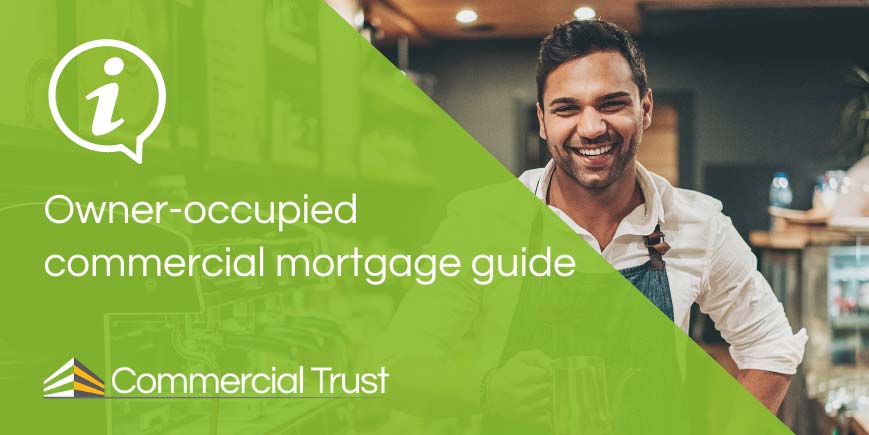This information should not be interpreted as financial, tax or legal advice. Mortgage and loan rates are subject to change.

Categories: commercial mortgages | guides
Commercial property is a wide asset class. There are industrial, retail, office, hospitality, and special purpose property types, and further sub-classes too. All will have various yields, supply, demand, and costs associated with them.
Before you commit yourself and your funds to any one in particular, it is important to understand which investment suits your particular need, so please read our guide to the different types of commercial properties.
Types of commercial property investments
Most buildings that are not intended as residential properties fall under the commercial property class. There are five main commercial property types:
- Industrial e.g. distribution centres, storage facilities, warehouses
- Retail e.g. clothing stores, groceries, furniture shops, etc.
- Offices e.g. standard business use across any industry, from a modest single room office to a multi storey office block.
- Special purpose, this is a catch-all term for commercial properties that cannot be categorised into the other larger categories, so theatres, garages, scrapyards, etc.
Industrial space
Investing in industrial commercial property can offer favourable yields because:
- Tenants provide stable cash-flow
- Long-term leases offer consistent income
- Maintenance costs can be lower
This means your net rental income is can be both large and stable, when compared to other commercial property asset classes.
This is however by no means definitive, the market is always changing as new conditions affecting which asset class comes out ahead – due diligence is imperative when investing in high value assets.
Office space and self-storage facilities
Office spaces as well as self-storage spaces both typically offer long-term tenancies and so have stable gross monthly income, however, they differ in many other ways from one another.
While the gross rental income for office space is often higher than self-storage, the yield made by investing in self-storage facilities can be higher, as less of your gross monthly income is spent on maintenance.
Office spaces tend to have higher maintenance costs because ultimately more people will be occupying an office space than a storage unit. Companies will typically require things like ventilation, lighting, and technical capabilities that add to this cost.
The benefits with investing in commercial office space is that, just like with residential properties, over time the property tends to increase in value.
Flex spaces – warehouses with available office, storage, and sometimes retail space
Flex spaces have gained in popularity due to their cost-effectiveness in comparison to traditional office spaces and their capacity for easy adaptation to meet the specific requirements of a company.
Flex spaces can also serve as suitable venues for retail purposes, where they can feature a front showroom alongside a back warehouse designated for inventory storage.
Mixed-use buildings
Mixed-use buildings are properties that combine commercial and residential use. A common example would be retail use on the ground floor and residential on upper levels; however, you can have horizontally separated buildings too.
Investing in mixed-use buildings can be attractive to investors as you can collect rent from two different tenant types. Mixed-use buildings may also be attractive for tax purposes, as stamp duty is paid on the property as a whole as opposed to each individual unit.
Retail units
Retail properties are another commercial asset class you could consider. Before investing in one in particular, it is best to consider:
- What is the footfall of the location?
- Is the size of the property sufficient for the type of retail you or a tenant will be conducting?
- Is the property easy to access, is it easily visible to the public?
- What’s the condition of the property?
- Are there on-site amenities?
- What would the utility/maintenance costs be?
Retail is a changing industry, with a large shift to online interaction. It is important to be aware if trends in target audience behaviour may impact the profitability of your investment.
What you should consider to make sure you choose the right commercial property investment
There are many things you need to consider when choosing the right commercial property. You need to determine your goals and strategy, evaluate the property in terms of profitability, and analyse economic trends in the local and wider region. We will talk you through all of this in the following sections.
Determine your goals and strategy
There are two key ways of using an investment in commercial property. You can either operate your own business from it, or rent it to others to operate from.
But ask yourself what you are hoping to achieve? Are you hoping to supplement your monthly employment income to improve your quality of life? Is this a long-term investment to contribute towards retirement income? Is this to pass onto your children? Are you ‘flipping’ the property to turn a quick profit? While of course everyone wants to maximise profit, what sort of annual yield would be worth the time and effort?
These are the sorts of questions you need to be asking and answering.
Once you have made these decisions, you want to turn to your strategy to achieve these goals. What sort of commercial property type would best suit your situation?
If you plan to become an owner-occupier of a commercial premises, your requirements may be fairly clear cut, given the nature of the business you will be running from the property. If you are investing only to let to others, you may have wider considerations.
Evaluating properties for profitability
To evaluate the profitability of a property you are thinking of investing in, you will need to calculate your expected annual yield.
You do this by taking gross rental income and subtracting costs, for example:
- mortgage payments
- letting fees
- ground rent
- insurance
- maintenance costs
What you are left with is your ‘net rental income’.
You then divide your net rental income by the property’s value. Expressed as a percentage, this is the expected annual yield of the property.
Analyse market and economic trends
When you are buying for investment only, your choice of commercial property type is likely to be influenced by where you are looking to invest. Or, you may choose a location for the potential yields it can offer, for an industry you have experience in.
Analyse demand. Will you have a large choice of tenants? A choice in tenants mean you can pick and choose who you feel will be the best tenant for you. Someone with evidence of long-standing business profits, so they are able to pay rent. Someone amenable to deal with. Someone whose future business prospects are strong.
What is the state of the local economy? Will that impact your ability to let your property? Is the area about to receive investment and grow, or is there anything on the horizon that may lead to people moving out of the area?
Factors like these are important to be aware of as the side effects could impact your premises and its ability to generate a profitable income.
Some common mistakes to avoid in commercial property investment
Committing to commercial property is a big step, and while it can be lucrative, there are definitely common mistakes first-timers can make. Here are a few.
Overspending on property acquisition and renovations
To make sure you don’t overspend on acquiring a commercial property, or invest in a property that subsequently requires high cost renovations to make it ready to let out, hire an appraiser to assess its market value. This will give you an idea of how much money to invest in it.
Don’t over or underestimate renovations. They are a cost to you, if you spend too much you may not quickly make that back in the rent. If you don’t do enough to make your property a viable and useful space to occupy, you may struggle to attract a tenant, or the right tenant.
To make sure you don’t overspend on buying the property, use the appraisal to negotiate a fair price and ensure it is aligned with your business plan.
Ignoring tenants and poor property management
Avoiding property maintenance to save money typically only ever costs you more in the long run. A small problem will only get worse over time and become more costly to fix. Better to spend hundreds now than thousands later.
Ignoring tenants will also cost you in the long run, as the ideal scenario is long-term stable tenants that pay monthly rent. If they become unhappy because you are not communicating with them they may leave. It can take weeks to find replacement tenants; all the while causing you losses in rental income whilst you still have to pay out costs.
Failing to conduct adequate due diligence
It is imperative you conduct adequate due diligence before acquiring a property.
Make sure you appoint a surveyor to undertake the necessary property inspections and surveys to assess a range of factors like:
- The structural quality of the build.
- The state of the electrical.
- The state of the plumbing.
- Likelihood of flooding in the area, etc.
Setting aside a contingency fund, is a sensible measure to help protect you from unexpected costs if a problem arises. You may want to consider a budget of 5-15% of your exposure for any unexpected costs.
Further reading
Now you have some background on assessing the profitability of various types of property, you may find it useful to read our guide to buying commercial property, the natural next step in the process.
Commercial Trust can help you with a commercial mortgage
When you are ready to buy a property, get in contact with our specialist commercial advisors to discuss your mortgage options.
We talk our clients through the process, find the most competitive deals, make the application for you and work with the lender and solicitor to get the deal through to completion as quickly as possible for you. These processes are aimed at saving you both time and money and generally making the potentially stressful process of buying property as smooth and easy as possible for you.
You can talk to us on live chat, call us, or enquire online.
FAQs
Commercial property is generally more expensive than residential property.
If you need a mortgage, as well as an adequate deposit, a lender will look for experience in letting commercial property, if you are buying for investment only. If you are intending to run your own business from the property, the lender will want you to have industry experience and a strong business plan as well as a deposit.
Commercial property can offer higher yields than residential rental property because they typically generate more rent.
There is however more regulation and paperwork involved with a commercial property, due to the more complex nature of a commercial premises.
You will need a deposit of 25% to 40% of the property’s value. If you’re a first-time investor, a lender typically looks for a deposit at the higher end of this range, because without experience you carry more risk.
Commercial property can offer strong rental yields, which means they can be more profitable than a residential rental property. But, they carry more risk and there is a greater amount of work required with commercial property investment.


